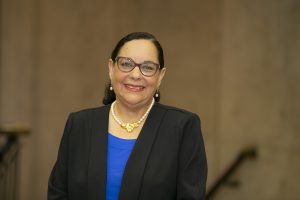Including a diverse group of patients in cancer clinical trials is critical for developing therapies that work for everyone. Studying cancer biology and response to treatment in a variety of groups has become increasingly important as therapies take a more personalized approach to treating cancer. However, African Americans and other minorities are often underrepresented in these studies—a gap that may be partially responsible for the fact that people of color continue to suffer worse cancer outcomes than white patients.
 With V Foundation funding, Lourdes Baezconde-Garbanati, PhD, from the USC Norris Comprehensive Cancer Center is working to help African American communities in Los Angeles take full advantage of cutting-edge cancer care, including the opportunity to participate in cancer clinical trials.
With V Foundation funding, Lourdes Baezconde-Garbanati, PhD, from the USC Norris Comprehensive Cancer Center is working to help African American communities in Los Angeles take full advantage of cutting-edge cancer care, including the opportunity to participate in cancer clinical trials.
Los Angeles has the seventh-largest Black population in the United States, a group that includes not only people of African ancestry born in the U.S. but also those born in Africa or the Caribbean. A history of discrimination and unethical treatment has led some in these communities to distrust scientific and healthcare organizations and fueled misconceptions about how cancer research works, decreasing their willingness to participate in clinical trials. Transportation and technology challenges can also create barriers to participating in in-person or virtual clinic visits.
“We want to figure out how to make clinical trials more accessible and to improve clinical trial information so that folks in the African American community can make sound, informed decisions about their care,” said Baezconde-Garbanati. “We are doing this by working closely with community leaders as well as faith-based and other organizations to advance knowledge and change attitudes toward clinical trial participation.”
Collaborating to save lives
Baezconde-Garbanati and her colleagues are working with 40 community partners and faith-based organizations to carry out a multi-faceted education and outreach program. “We want to raise awareness so that patients and their families will know that there are lifesaving mechanisms out there that they can potentially access,” she explained. “We are also addressing important ethical issues head-on while building trust by working through community partners.”
An important part of the outreach program is a new toolkit that the researchers developed to equip community members with a better understanding of what it’s like to participate in a cancer research study, how to enroll in clinical trials and what questions to ask their doctor. The manual is the first of its kind to target the entire African American community, including African nationals.
Baezconde-Garbanati’s team has also organized a community conference that features a section on clinical trials focused on African Americans and other vulnerable populations. It also includes a panel of patients who will share their own experiences with clinical trials. The researchers plan to expand on these personal stories by posting short vignettes of patients speaking about their experiences on social media.
“We really believe in the power of storytelling,” said Baezconde-Garbanati. “Having individuals talk about their own experiences can help move the needle toward greater research participation for this community.”
Expanding the reach
As the COVID-19 pandemic spread into the communities they were working with, the researchers were dismayed to see cancer survivors becoming infected and even dying from the virus. Treatments leave many cancer survivors severely immunocompromised, and many of the survivors the researchers worked with were being exposed to the virus through family members who were essential workers. It was clear that incorporating COVID-19 education into their outreach efforts was critical to protecting this vulnerable group.
The V Foundation support also laid groundwork that has helped the research team expand their efforts. For example, with funding from the Lazarex Cancer Foundation, they are now creating pop-up wellness hubs for delivering cancer information directly to the community. These hubs, held at local YMCAs and churches, can also provide technology access for a telemedicine appointment or organize a ride to a clinic appointment.
“It can be difficult to get funding for outreach and engagement around cancer clinical trials even though these campaigns raise awareness that then facilitates the research,” said Baezconde-Garbanati. “The V Foundation’s goal of being game-changing makes them open to this type of innovation because it could make significant changes in terms of people’s participation in research.”
Baezconde-Garbanati adds that her group has been encouraged by Jim Valvano’s own journey with cancer. “He kept fighting till the very end, and that has been an inspiration to all of us here at the USC Norris Cancer Center as well as to our communities,” she said. “We’re honored to be a part of his legacy through the work that the V Foundation still does today.”




